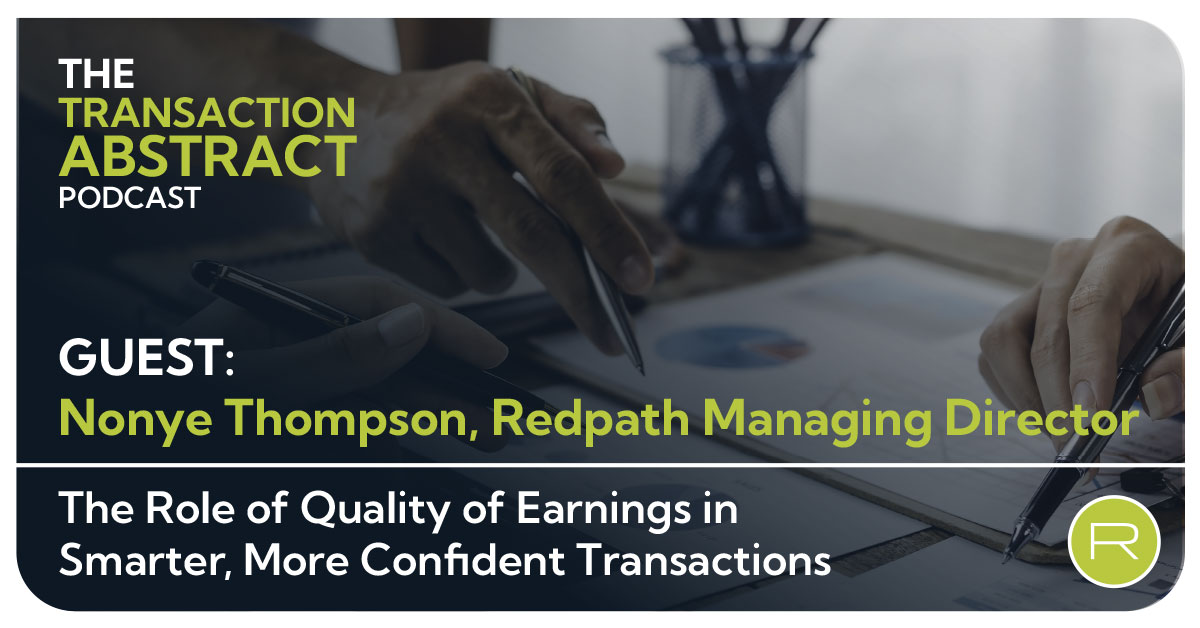The Role of Quality of Earnings in Smarter, More Confident Transactions
In this episode of The Transaction Abstract Podcast, Joe Hellman sits down with Nonye Thompson, Managing Director in Redpath’s Transaction Advisory...
![The Role of an Attorney in M&A Deals [PODCAST]](https://www.redpathcpas.com/hubfs/AdobeStock_182621452_adobespark.jpeg)
When entrepreneurs prepare to sell a business, they are often under the impression the bank or other financier is the most important party to be concerned about. But many other specialists touch M&A transactions. It is crucial for both buyer and seller to have strong legal representation.
In a recent episode of The Transaction Abstract, Joe spoke to Mike Kuhn, a partner at Ballard Spahr LLP. Ballard Spahr represents companies and private equity funds during M&A transactions. The firm operates fifteen offices across the U.S., including in Los Angeles, New York, Philadelphia, and Washington, DC.
Read on or listen to the episode below for insights on the importance of legal counsel, differences between attorneys and investment bankers, tax liabilities, and more.
Selling a business is something most company founders only do once in their lifetime and having advisors experienced in these complex transactions is key to getting to the outcome that you want. Even if you have a longstanding relationship with a trusted legal firm, you should consider bringing in a specialist to help augment their expertise.
Mike suggested anyone planning to sell a business have these priorities:
The right lawyers have a versatile and extensive role throughout the transaction. They help to structure the deal on the front end, examining its implications in terms of tax efficiency, legal liability, and the goals of their client. This begins with client communication and discussions.
The right law firm helps you optimize your transaction for desired outcomes:
There is significant crossover between the legal needs of sellers and buyers. Preferred structure, tax impact, and dollar value are just as relevant. Because of the complexity involved, neither buyers or sellers are likely equipped to be experts on all aspects of M&A transaction – outside perspective is critical.
The role of the law firm differs sharply from that of the investment bank in a few key areas:
Sellers often need to be protected against post-deal claims on matters such as sales tax and other tax exposures already known to both parties at the time the agreement closes. Buyers may argue to reduce the purchase price by the outstanding amount, but this approach is not preferred by sellers.
Instead, sellers typically make an agreement to pay certain known tax liabilities as they arise. This can add complexity, as a buyer’s decision to expand sales tax collection to additional states can trigger a “look-back” resulting in further liabilities from previous years.
In situations like these, the seller’s legal representation works to:
While it may be necessary to concede some points, counsel always works to constrain liability, especially as it relates to adverse findings in the future. It is important sellers recognize any legal discussion is not an “attack” on their business leadership. Instead, it is needed to get a holistic view of the transaction.
Buyers often turn up matters in due diligence that are years out of date and only require the right documentation to settle, such as product liability for offerings no longer within the business. The more often a seller can show potential issues resolved in a responsible manner up front, the better.
Even late in a transaction, when term sheets are in hand, the right law firm makes a difference. Such late interventions are vital to protect sellers who feel their interests are not properly represented. It is often not necessary to amend the term sheet or letter of intent; the purchase agreement becomes the focus.
In cases like these, attorneys begin by reviewing the deal structure, ensuring that it does not “mix” the purchase of assets and stock in an improper way. After the existing language on the terms sheet has been evaluated, the firm will present its view of the finalized agreement for both parties to sign off on. Only then can the attorney go forward in drafting final language for the transaction to be realized.

In this episode of The Transaction Abstract Podcast, Joe Hellman sits down with Nonye Thompson, Managing Director in Redpath’s Transaction Advisory...

In this episode of The Transaction Abstract Podcast, Joe Hellman sits down with Dan Hennessey, the newly appointed CEO of Sam Schwartz Pedestrian...
![Common Legal Pitfalls in M&A Transactions with Kim Lowe [PODCAST]](https://www.redpathcpas.com/hubfs/Podcast-Legal-Pitfalls-Kim-Lowe.jpg)
In this episode of The Transaction Abstract Podcast, Joe Hellman sits down with Kim Lowe, Partner at Avisen Legal, to discuss the most common legal...